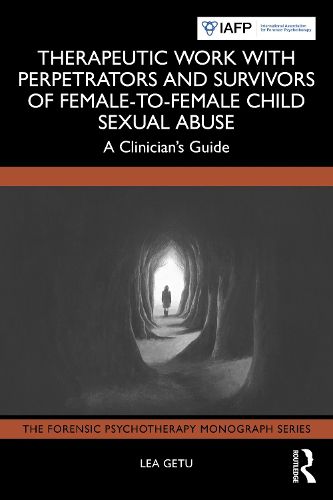Readings Newsletter
Become a Readings Member to make your shopping experience even easier.
Sign in or sign up for free!
You’re not far away from qualifying for FREE standard shipping within Australia
You’ve qualified for FREE standard shipping within Australia
The cart is loading…






This book provides a guide to working with survivors and perpetrators of female-female child sexual abuse (F-FCSA), examining the clinical challenges of treating perpetrators and survivors of F-FCSA and how to overcome them.
Divided into two parts, the first part of the book sets F-FCSA in its historical, societal, and intra-psychic context, reviewing why some women abuse children, the barriers to recognising this, and the prevalence of F-FCSA. The book also sets out ways to work more effectively with survivors and perpetrators by drawing from in-depth interviews with prominent therapists working in the field. Topics addressed include working with extreme splitting, enmeshment, and integration; complex countertransference and transference; recognising embodied feelings; and processing the extreme impacts of the work on the therapist and the therapeutic relationship. Through the heartfelt voices of the therapists and clinical case studies, this book teaches clinicians how to manage the extreme emotions evoked by difficult narratives and behaviours of the clients and how to have a new and deeper understanding of empathy as the key within this difficult work.
This is an important read for clinical psychologists, psychotherapists, forensic psychotherapists, counsellors, social workers, and other professionals working with this client group.
$9.00 standard shipping within Australia
FREE standard shipping within Australia for orders over $100.00
Express & International shipping calculated at checkout
This book provides a guide to working with survivors and perpetrators of female-female child sexual abuse (F-FCSA), examining the clinical challenges of treating perpetrators and survivors of F-FCSA and how to overcome them.
Divided into two parts, the first part of the book sets F-FCSA in its historical, societal, and intra-psychic context, reviewing why some women abuse children, the barriers to recognising this, and the prevalence of F-FCSA. The book also sets out ways to work more effectively with survivors and perpetrators by drawing from in-depth interviews with prominent therapists working in the field. Topics addressed include working with extreme splitting, enmeshment, and integration; complex countertransference and transference; recognising embodied feelings; and processing the extreme impacts of the work on the therapist and the therapeutic relationship. Through the heartfelt voices of the therapists and clinical case studies, this book teaches clinicians how to manage the extreme emotions evoked by difficult narratives and behaviours of the clients and how to have a new and deeper understanding of empathy as the key within this difficult work.
This is an important read for clinical psychologists, psychotherapists, forensic psychotherapists, counsellors, social workers, and other professionals working with this client group.